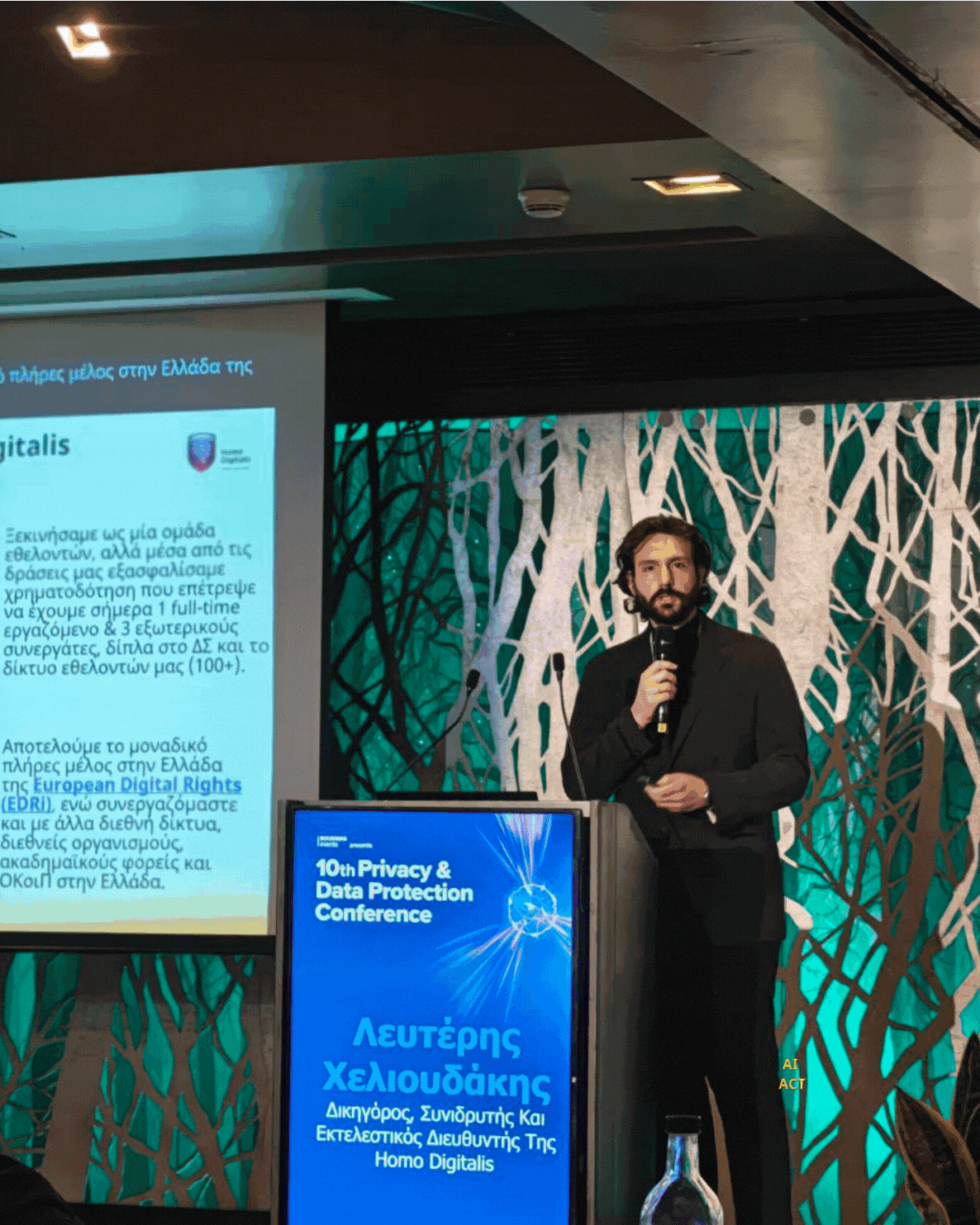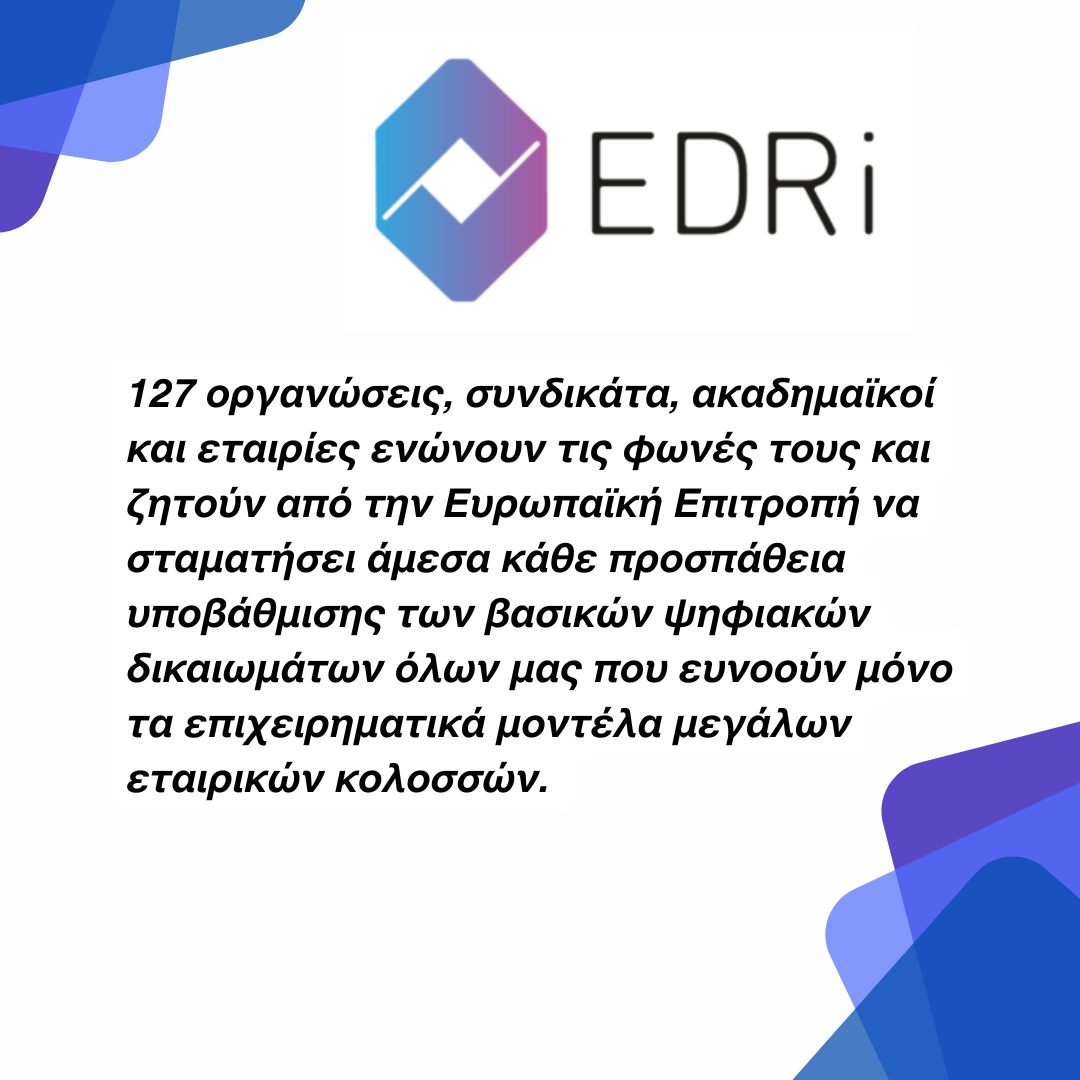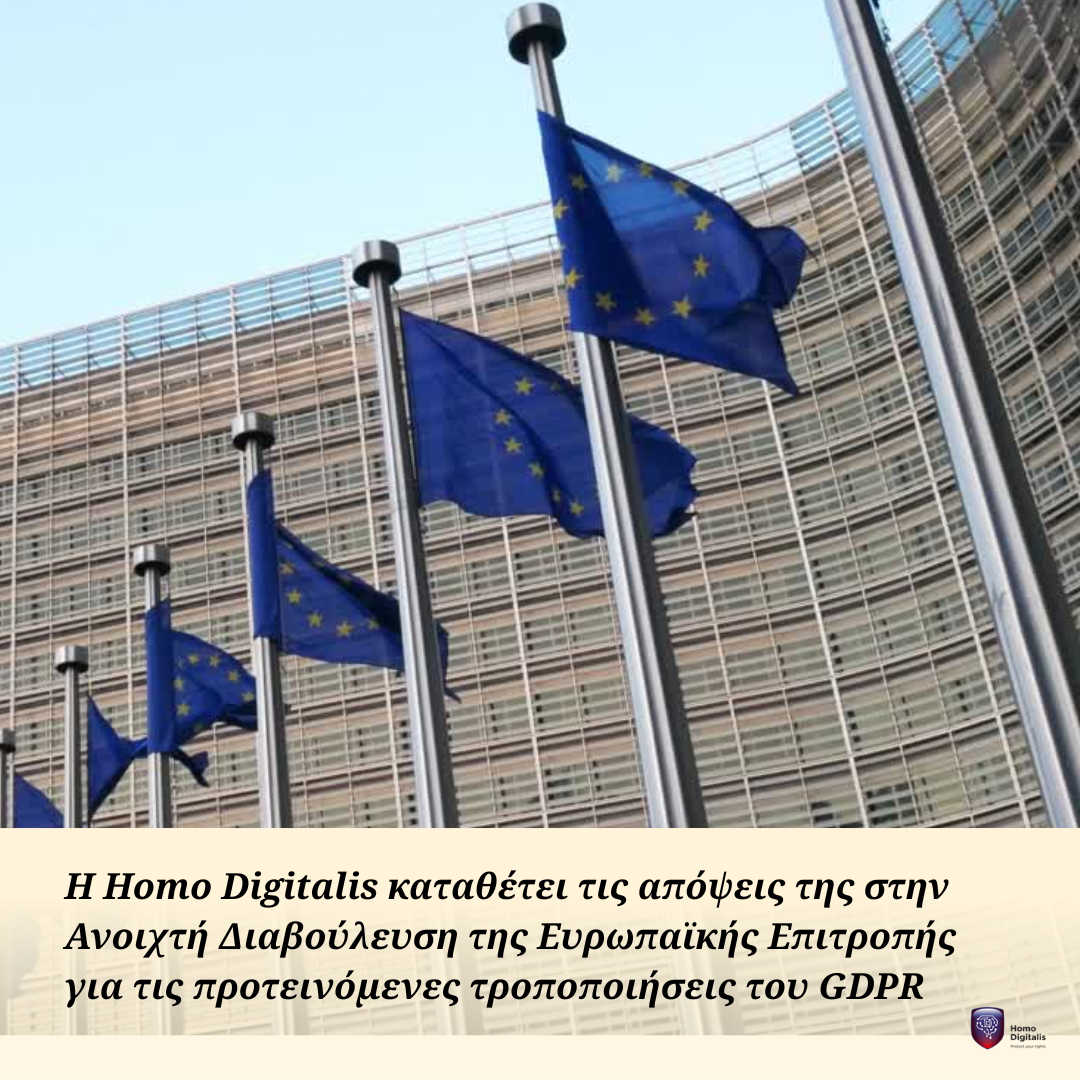We presented our Study on the Digital Omnibus package at the Privacy & Data Protection Conference
Last Friday, Homo Digitalis was invited to the Privacy & Data Protection Conference, organized by BOUSSIAS.
There, our Executive Director, Eleftherios Chelioudakis, presented our Study on the Digital Omnibus reform packages, highlighting the challenges that the proposed changes pose to our rights in the contemporary digital era.
You can read our Study here.
We would like to warmly thank the conference organizers, and especially Alexandra Varla, for the very honorable invitation. Congratulations as well to all the speakers for their insightful contributions.
.
Homo Digitalis speaks on ERTnews
On Thursday, December 11, Homo Digitalis had the great pleasure of being a guest on the ERTnews program “LIVE NOW”, hosted by Giorgos Kakousis and Nikoleta Kritikou, to discuss the upcoming revisions to the U.S. visa waiver program, ESTA.
The proposed changes foresee the collection of more—and particularly sensitive—personal data, including biometric data, email accounts from the past 10 years, and social media accounts from the past 5 years, among other information.
The plan of the U.S. government is to complete the agreement procedures with the various countries participating in the ESTA visa waiver program by December 2026, so that the new rules can begin to apply from the following year.
The European Union has already, since the summer, initiated the required institutional procedures in order to negotiate at EU level with the United States the framework for the exchange and processing of the relevant data. This framework is expected to form the basis of a comprehensive agreement between the EU and the U.S., upon which Member States, such as Greece, will subsequently be called to conclude the necessary bilateral agreements for the implementation of the new ESTA regime.
In the field of personal data protection, the European Data Protection Supervisor has already issued a relevant opinion on the matter since September. This opinion focuses primarily on the exchange of biometric data, as well as on the necessary safeguards of security, oversight, and accountability that must accompany their processing.
Homo Digitalis was represented on the program by our Executive Director, Lefteris Chelioudakis. We warmly thank ERTnews for the invitation! You can watch the relevant segment here (from 47:00 onwards) here.
Homo Digitalis & EDRi speak to inside story on the proposed Digital Omnibus regulations
Ιs Europe moving away from the protection of our digital rights?
inside story. and journalist Eliza Triantafyllou published an in-depth article on Monday, December 1, examining the European Commission’s Digital Omnibus proposals. European Digital Rights (EDRi) and Homo Digitalis had the honor of contributing comments and arguments, represented by their members Blue Duangdjai Tiyavorabun, Ella Jakubowska (she/her), Itxaso Domínguez de Olazábal, PhD, and Eleftherios Chelioudakis.
Is the EU giving in to pressure from Trump and major technology companies to deregulate rules protecting Europeans’ personal data and privacy, rebranding it as “simplification”? What exactly do the two recent proposals include? Read the article here.
We warmly thank the journalist for her interest in our arguments.
Homo Digitalis gives an interview on ATHINA 9.84
This Friday, November 28, at 19:30, tune in to ATHINA 9.84!
Homo Digitalis is delighted to be a guest on the radio show of the Hellenic League for Human Rights, where we will talk about our work in the field of digital rights.
Our Co-founder and Treasurer of the Board, Konstantinos Kakavoulis, will represent us, while the show will be hosted by Taygeti Michalakea, Board Member of the Hellenic League for Human Rights.
We warmly thank them for the kind invitation and the honorable interest in our work!
Press Release on today’s announcement of the Digital Omnibus packages:
The proposed provisions of the Digital Omnibus were made public today, placing our rights and the safeguards protecting us in the digital environment at serious risk.
These new proposed regulations threaten the core of the European data protection framework and a range of other digital rights, directly affecting key instruments such as the GDPR, the ePrivacy Directive, and the AI Act.
The European Commission’s broader deregulation agenda primarily serves the interests of large technology companies, sidelining fundamental rights. Through these choices, the European Commission is effectively deviating from its mission and failing to fulfil its institutional responsibility.
We call on the Council of the European Union and the European Parliament to reject this attempt to dismantle the European framework for Digital Rights, and instead to focus on the consistent and effective enforcement of the rules that are already in place.
Read our full press release here.
Joint Open Letter on the Digital Omnibus Packages to the European Commission
On Wednesday, 19 November, the European Commission will present the new “Digital Omnibus,” a reform that threatens to dismantle fundamental protections of our rights and freedoms in the digital sphere.
In May and October 2025, we warned through open letters that this initiative is part of a broader wave of deregulation that will weaken key European rules, portraying rights as an obstacle to innovation and serving the interests of major technology companies.
A few days ago, leaked draft documents confirmed our fears: the EU is one step away from the largest rollback in the protection of human rights in the digital space. The GDPR, ePrivacy, and even the already weak provisions of the AI Act appear to be targeted for dilution, along with other related legislation.
Together with European Digital Rights, 127 organizations, trade unions, academics, and companies are joining their voices and calling on the European Commission to immediately halt any attempt to undermine our fundamental digital rights—efforts that benefit only the business models of large corporate giants.
Read our letter here.
We spoke to NEWS247 about the data breach incident involving the Italian company doValue.
Homo Digitalis gave statements to journalist Eftychia Soufleri and NEWS247.gr regarding the hacking of the Italian company doValue, one of the largest loan management companies in Europe.
16 terabytes of personal data — that’s how much hackers claim to have stolen from the company’s systems, even posting an ad on the dark web to sell them. Our Co-founder and Executive Director, Eleftherios Chelioudakis, represented us by giving statements on the matter.
Find out more about here the sensitive personal data collected by debt collection companies, how much such data is worth on the dark web, and what the obligations of the doValue Group and its subsidiaries, including the Greek subsidiary doValue Greece, are — in case the hack also affected their systems, if the hackers’ claims prove true.
We would like to thank the journalist for including our statements in her article.
We submitted our views to the European Commission’s public consultation on Article 30(5) GDPR
Yesterday, Homo Digitalis submitted its views as part of the European Commission’s public consultation on Article 30(5) of the GDPR.
In our submission, we call on the Commission to withdraw the proposed amendment and stress the need to ensure that the GDPR is not reopened or modified through broader deregulatory initiatives. The priority must remain on the effective application and enforcement of the existing framework, rather than on reducing the safeguards that are essential for protecting fundamental rights in the digital age.
You can read our full position here.
Homo Digitalis spoke on smart farming and the AI Act
In the beginning of july, the AgriDataValue project hosted an in-depth online workshop dedicated to data privacy, legal, and ethical dimensions within the context of smart farming. Organized by Netcompany, the event brought together AgriDataValue partners, Advisory Board members, legal experts, as well as representatives from related EU-funded projects.
Homo Digitalis participated in the workshop, giving a legal presentation on the topic “Smart Agriculture from a GDPR and AI Act Perspective”. Many thanks to Ioannis Chrysakis for the kind invitation! Our Executive Director, Eleftherios Chelioudakis, represented us.
The objective of the workshop was to identify and validate key ethical, legal, social, and privacy-related topics linked to the AgriDataValue platform. It also served as an opportunity to review data flow mappings between the project’s technologies, user types, and integrated services, a vital exercise for ensuring compliance, transparency, and responsible data governance.








